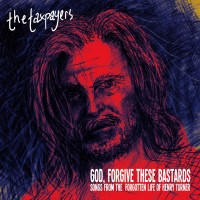AngryDerek's favorite band is back and this time they've upped the punx further with a more hardcore-influence and continue getting weird with heavier doses of jazz. "God, Forgive These Bastards" Songs from the Forgotten Life of Henry Turner is a jazz-punk concept album about a college baseball-player-turned-homeless-man. Things open with a saxophone on "As the Sun Beat Down"--a midtempo song that gives the listener a good idea of what they are in store for, including a bit of Rob's signature shouting. The rambunctious "Atlanta's Own" follows and it starts out sounding like a Pink Panther movie before the drumming speeds up and the band gets rowdy and fast while Rob and Danielle speedily yell commentary on a baseball game in which Turner injures himself, ending his career before it ever truly began.
The speed remains with "Who the Hell Are You" in which Turner states he "coulda been a big deal back in â79". The next song, "Goddamn These Hands," sounds like a significantly more jazz-y and slightly mellower cross between A Rhythm in the Cage's "White Walls" and To Risk So Much for One Damn Meal's "Geodesic Prison Song" until the vocals end and the band plays for another minute with a steady beat and prominent saxophone. The acoustic "Drinking with Mickey Mantle" brings down the energy level while Turner reflects on his relationship with his grandfather that seemingly set up his interest in baseball and ends with the sentimentally delivered lines "In the package he left under the tree / Was a new silver wristwatch addressed to his favorite grandson, Henry."
More Pink Panther-y jazz plays through "Raised in the Shadows" (or maybe I'm just too uncultured to associate jazz with anything other than Peter Sellers movies) which only has a few quick lyrics before an interview about Turner injuring his hand on the bus begins playing over the music. The next song, "Weapon of God," finds these goofpunx channeling glimpses of a heavier version of the band in Robot Hell--sans the notable barroom piano--in a song with lyrical imagery rivaling that of "Halloween" by the Misfits. On the following hardcore song, "Jimmy Bartlett's Teeth," Danielle takes lead vocals over a driving beat, barking about an acquaintance from Turner's youth being beaten with "pipes and rusty chains" and Turner's childhood house being burnt down. Danielle finishes up by screaming "That's alright" at the top of her lungs repeatedly before Rob hurriedly delivers the last verse, ending the song with "There ain't no moral to that / And there ain't nobody to blame / It's just one of those things."
The much mellower and undeniably bouncy "Hungry Dog in the Street" sounds like it could have easily been on To Risk So Much for One Damn Meal. Despite the music, "Hungry Dog in the Street" has some of the most negative lyrics of the album with lines like "My heart is a cancer / Radiation wouldn't help a thing / My God doesn't answer / I pray nightly, every single week." "The Businessman" starts out as a simple jazz number as Rob's vocals slowly become more and more desperate alongside tense, gently accelerating music that culminate in a wee bit of cacophony accompanied by shrieks in the background. In the song, Turner tells Rob a story about biting off the ear of someone in a business suit who "might've been the Devil" to defend himself against the possibility of being robbed. The next song, "The Carriage Town Clinic," has the standard Taxpayers energy and sound, but with a slight Mountain Goats-esque aspect to the lyricism at certain moments, ending with the lines "My people they are coming, they are coming to get me / My people will come to release me."
The next track, "I Love You Like an Alcoholic," is a musically soothing duet between Rob and Danielle and an ever-changing chorus that will get stuck in your head almost instantly. The duet ends and the song winds down with an accordion and a banjo before the somber "Some Rotten Man" begins. "Some Rotten Man" has lyrics as sad as those of "Hungry Dog in the Street," but the music to match and more personal, contemplative aspects to the words, really twisting the knife. The song ends with Rob singing "I can't believe the mess I've made of things / And of course, I know you could have done much better / And I know that I must have been a real fucking nightmare / Some rotten man / Nobody's savior / Your oldest friend" before the band plays out the rest of the song, letting the lyrics really sink in while the listener ruminates.
The album closes out with the calm "Let the Seconds Do Their Worst" while an interview with one of Turner's childhood neighbors plays, discussing a time when Turner almost accidentally burnt down her house and how "he was a real ass from time to time, but he was one of those kinda lovable ones that you can't help but like even though you know he's gonna be an ass."
Despite God, Forgive These Bastards being a concept album based on a book of the same title that I have yet to read (available from Cantankerous Titles), the album is still an incredibly enjoyable listen. That is partly because Henry Turner was not only a baseball player, but--like all of us--many other things. More importantly, the album "works" because the songs all stand perfectly on their own and don't have the feeling of an arcing story set to music. Rather, they are each a small window into a moment in Turner's life and, if I may wax philosophical for a moment, possibly windows into our own lives as flawed beings seeking redemption.
